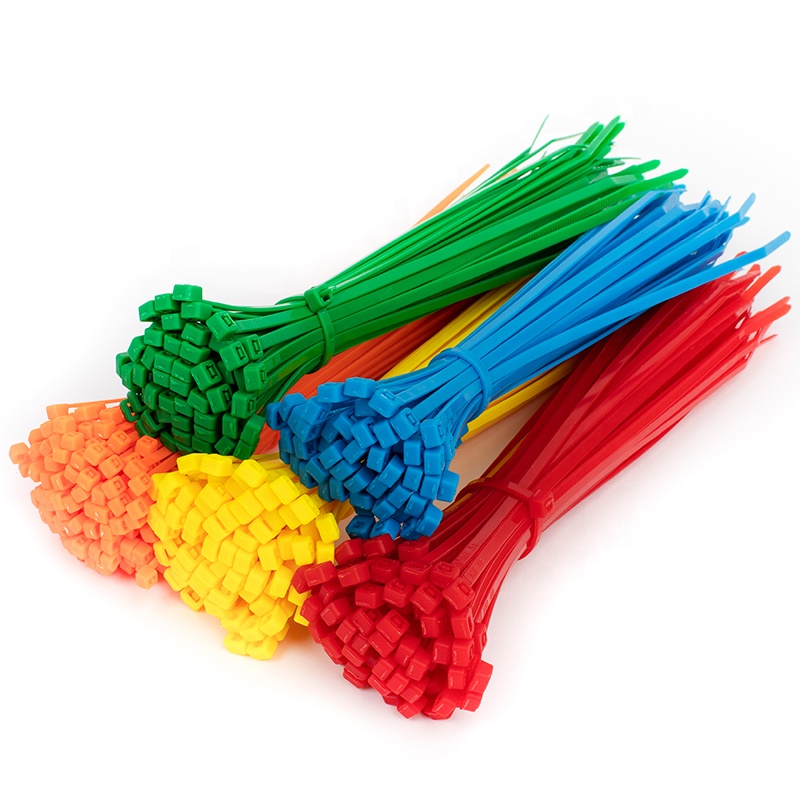How to determine cable ties Quality?
Cable ties are the most popular and economical products that CableTiesAndMore.com offers. The demand for the cable ties we manufacture and supply is exceptional. Not only due to their affordability but also because of their inherent quality. Furthermore, It is essential to purchase zip ties that are made with virgin nylon 6/6 resins, as quality raw materials affect the tensile strength and durability. Cable ties longevity and overall strength will be significantly affected if the wire ties are made using recycled material.
Cable Ties And More Experience
Cable Ties And More, has supplied and work with our manufacturing partners to ensure we offer the best quality cable ties and zip tie accessories for over 25 years. We have the experience and test data to prove our wire tie quality is second to none.
Common Zip Tie Applications?
One of the most common applications for cable ties is supporting and holding cables, wires, and other objects in place. Therefore, the quality of the cable ties are of utmost importance. Cable ties and more uses virgin nylon resins in the manufacturing of most types of cable ties to ensure consistently good quality.
How Are Cable Ties Made?
Nylon Cable ties are manufactured carefully by cyclical injection molding method wherein nylon resins are melted and then injected into the mold cavity. It’s shape and size depend on the mold used during the manufacturing process. The zip tie molding process involves two sets of molds. The first half contains the self-locking head mechanism called ratchet, and the second mold includes the tip of the cable tie that is designed to slide into the ratchet. When these two molds come together, molten nylon 66 or nylon 12 resins are then injected into the cavity, and the space between creates the shape of the zip ties. After inserting the molten nylon resins, the newly formed zip tie is allowed to solidify within the mold cavity. After the appropriate amount of time, the cable tie is removed from the mold. All freshly made zip ties are then gathered for quality inspection. When nylon wire ties are determined to contain defects relating to the molding process, the particular mold that created them is set to be replaced by a non-defective one. If it determined that there are no defects on the mold, the cable tie quality inspector will identify other possible causes that could have caused the fault.
Other possible reasons for a zip-tie defect during molding include:
- An unclean machine resin mold pipe
- Faulty pressure controls on the machine
- Using recycled nylon resin (all of our volglobal.com/a/product/p2/94.html' target='_blank'>nylon cable ties are made with virgin nylon 66)
- Mixed plastic nylon was used or an inappropriate heat transfer from recycled matter.
How Are Cable Ties Used?
Cable ties, are also known as zip ties or tie wraps in some areas of the United States. Zip ties are said to have an unlimited number of applications, such as: in households, offices, manufacturing industries, automobile industries, marine industries, electronic industries, and many more.
Cabletiesandmore.com ensures that we offer different sizes and types of cable ties that would be suitable for each specific type of application and their requirements. An example of this is the Stainless Steel zip tie that is recommended for applications that can resist various chemicals, salts, and acid exposure. Further, another example is the Velcro Ties and Straps, which are ideal for temporary, and reusable strapping and bundling of wires.
Cabletiesandmore.com is proud to boast its offering of high quality yet affordable cable ties that are available in different materials, lengths, and colors. End-users must know the requirements of their application to utilize the right capacity and strength of cable ties properly.
What are the different cable tie sizes?
- 4” Long 18 lbs Tensile Strength
- 5.5” Long 18” lbs Tensile Strength
- 5.5” Long 40 lbs Tensile Strength
- 8” Long 18 lbs Tensile Strength
- 8” Long 40 lbs Tensile Strength
- 8” Long 50 lbs Tensile Strength
- 8” Long 120 lbs Tensile Strength
- 9” Long 250 lbs Tensile Strength
- 11” Long 50 lbs Tensile Strength
- 11” Long 120 lbs Tensile Strength
- 14” Long 50 lbs Tensile Strength
- 14” Long 120 lbs Tensile Strength
- 15” Long 250 lbs Tensile Strength
- 18” Long 120 lbs Tensile Strength
- 19” Long 250 lbs Tensile Strength
- 22” Long 250 lbs Tensile Strength
- 24” Long 175 lbs Tensile Strength
- 28” Long 175 lbs Tensile Strength
- 32” Long 175 lbs Tensile Strength
- 36” Long 50 lbs Tensile Strength
- 36” Long 175 lbs Tensile Strength
- 40” Long 250 lbs Tensile Strength
- 48” Long 175 lbs Tensile Strength
- 60” Long 175 lbs Tensile Strength




